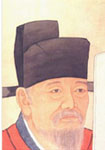
欧阳修(1007-1072),字永叔,号醉翁,晚号“六一居士”。汉族,吉州永丰(今江西省永丰县)人,因吉州原属庐陵郡,以“庐陵欧阳修”自居。谥号文忠,世称欧阳文忠公。北宋政治家、文学家、史学家,与韩愈、柳宗元、王安石、苏洵、苏轼、苏辙、曾巩合称“唐宋八大家”。后人又将其与韩愈、柳宗元和苏轼合称“千古文章四大家”。 欧阳修的古诗词
《留题齐州舜泉》是宋代欧阳修创作的一首诗词。这首诗词描绘了齐州舜泉的景色,并融入了对古代传说中的舜帝的怀念和对自然景观的赞美。
诗词的中文译文如下:
岸有时而为谷,海有时而为田,
Sometimes the shore becomes a valley, sometimes the sea becomes a field,
虞舜已殁三千年。
Emperor Shun has passed away for three thousand years.
耕田浚井虽鄙事,至今遗迹存依然。
Though farming and digging wells may seem humble tasks, their traces remain to this day.
历山之下有寒泉,向此号泣于旻天。
Beneath the Li Mountains lies a cold spring, where one can weep towards the heavens.
无情草木亦改色,山川惨淡生云烟。
Even the heartless plants and trees change their colors, and the mountains and rivers appear desolate, giving rise to clouds and mist.
一朝垂衣正南面,◇夔稷契来联翩。
One day, when I hang my clothes and face the south, the spirits of Kuixi and Jiqi will come together.
功高德大被万世,今人过此犹留连。
Their great achievements and virtues will be remembered by future generations, and even today's people passing by will be captivated.
齐州太守政之暇,凿渠开沼疏清涟。
In the leisure of the Qi Prefect's governance, canals are dug, marshes are opened, and the clear water flows freely.
游车击毂惟恐後,众卉乱发如争先。
The chariots and wheels move forward, fearing no obstacles, and the various plants bloom in disorder, as if competing to be the first.
岂徒邦人知乐此,行客亦为留征轩。
How can only the people of the state know the joy of this scene? Even travelers are compelled to stay and admire the pavilion.
这首诗词通过描绘自然景观,表达了对舜帝的怀念和对自然美的赞美。作者欧阳修以简洁而富有意境的语言,将自然景色与历史人物相结合,展现了对古代伟人的敬仰和对自然的敬畏之情。诗中还融入了对现实生活中的美好事物的赞美,以及对人们对美的共同追求的描绘。整首诗词意境深远,给人以思考和感悟的空间。
liú tí qí zhōu shùn quán
留题齐州舜泉
àn yǒu shí ér wèi gǔ, hǎi yǒu shí ér wèi tián,
岸有时而为谷,海有时而为田,
yú shùn yǐ mò sān qiān nián.
虞舜已殁三千年。
gēng tián jùn jǐng suī bǐ shì,
耕田浚井虽鄙事,
zhì jīn yí jī cún yī rán.
至今遗迹存依然。
lì shān zhī xià yǒu hán quán,
历山之下有寒泉,
xiàng cǐ hào qì yú mín tiān.
向此号泣于旻天。
wú qíng cǎo mù yì gǎi sè,
无情草木亦改色,
shān chuān cǎn dàn shēng yún yān.
山川惨淡生云烟。
yī zhāo chuí yī zhèng nán miàn,
一朝垂衣正南面,
kuí jì qì lái lián piān.
◇夔稷契来联翩。
gōng gāo dé dà bèi wàn shì,
功高德大被万世,
jīn rén guò cǐ yóu liú lián.
今人过此犹留连。
qí zhōu tài shǒu zhèng zhī xiá,
齐州太守政之暇,
záo qú kāi zhǎo shū qīng lián.
凿渠开沼疏清涟。
yóu chē jī gǔ wéi kǒng hòu,
游车击毂惟恐後,
zhòng huì luàn fā rú zhēng xiān.
众卉乱发如争先。
qǐ tú bāng rén zhī lè cǐ,
岂徒邦人知乐此,
xíng kè yì wèi liú zhēng xuān.
行客亦为留征轩。